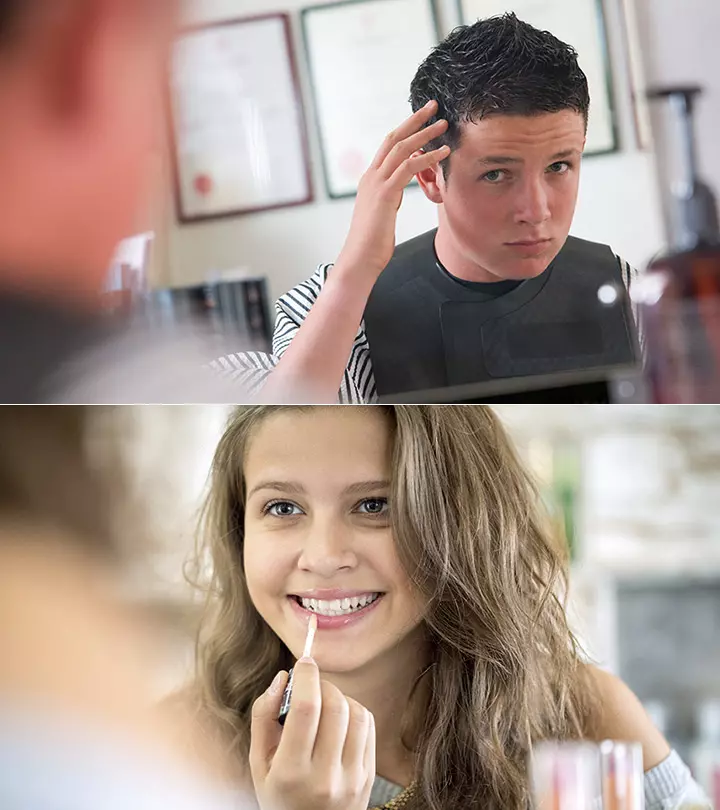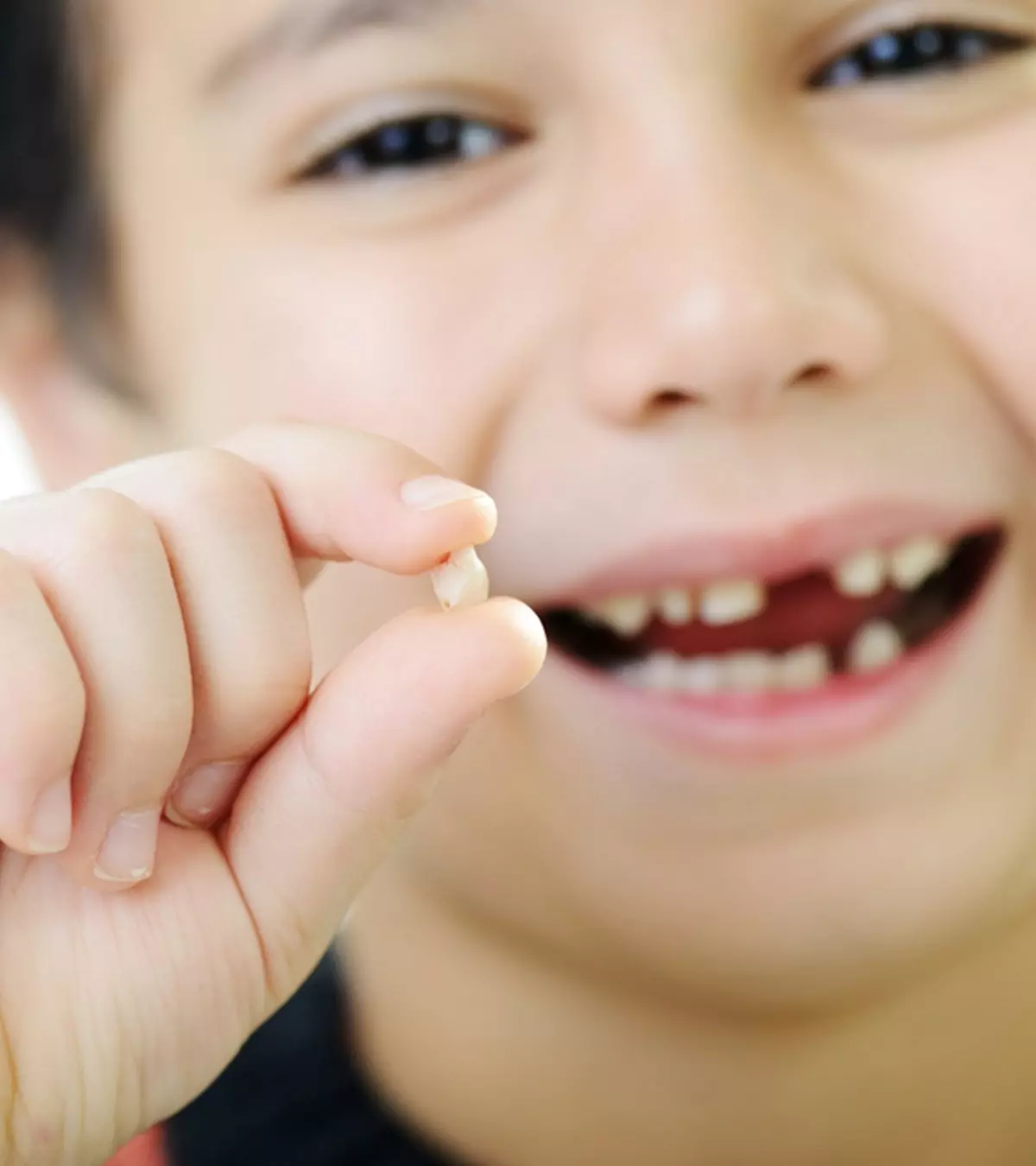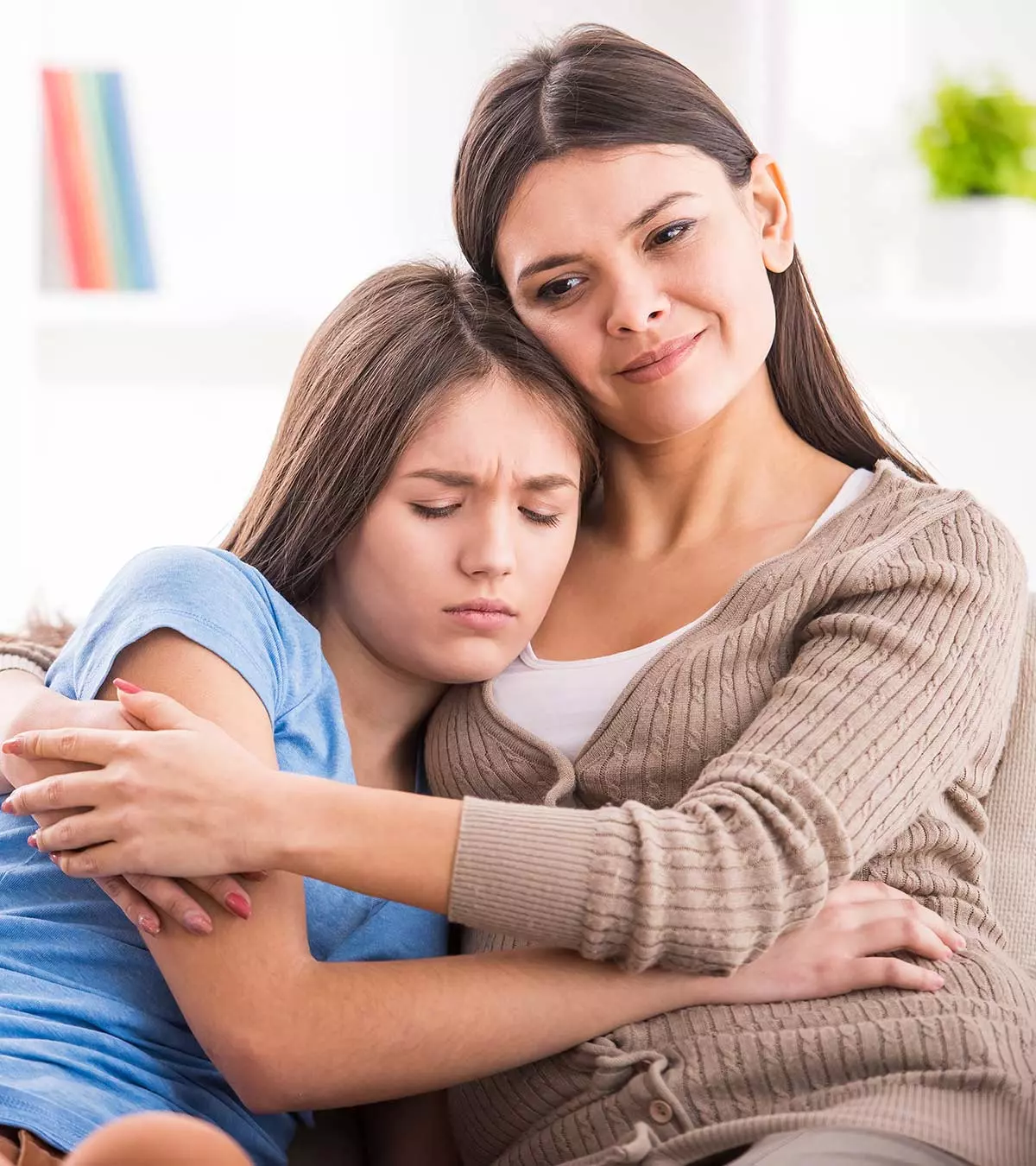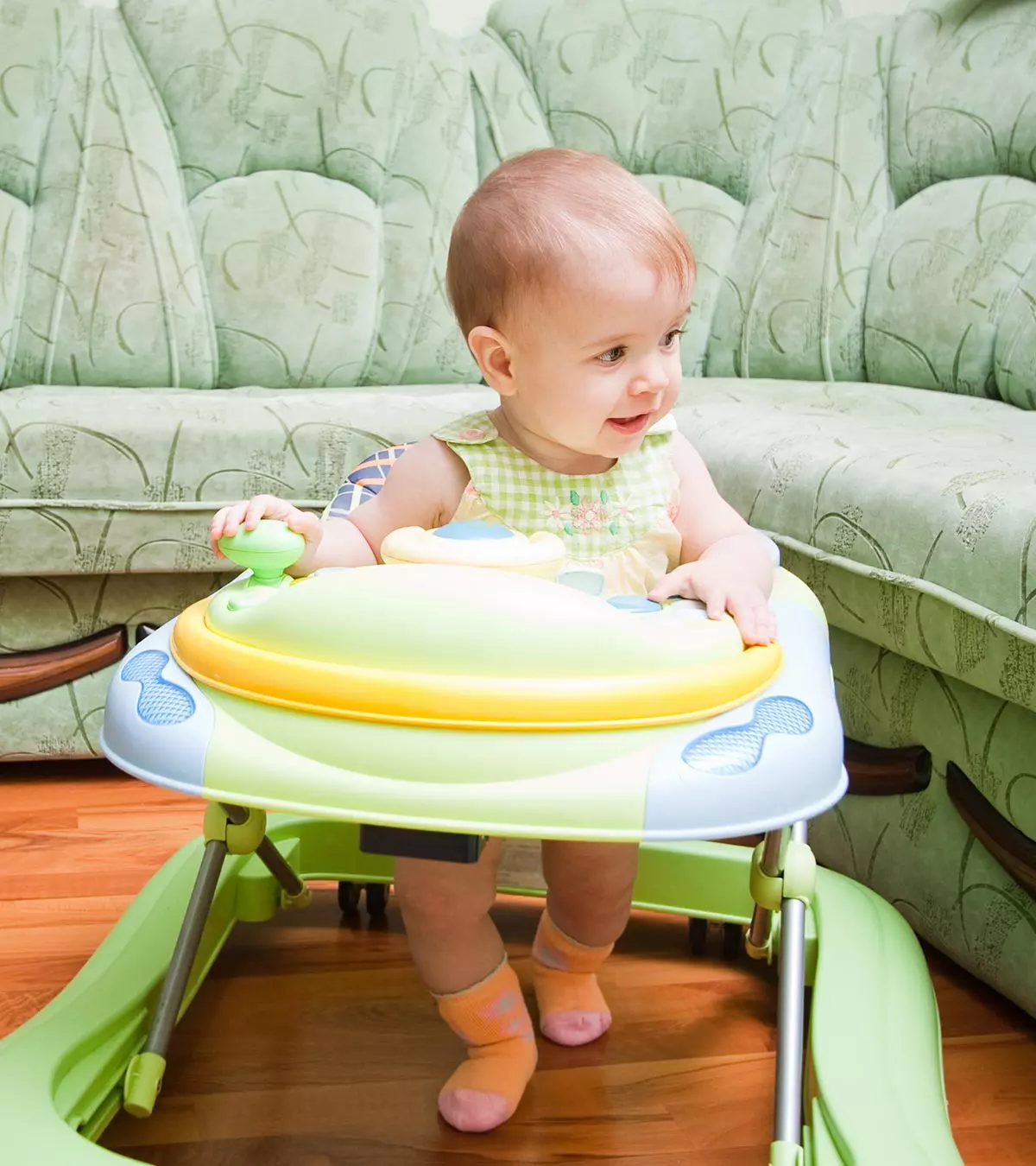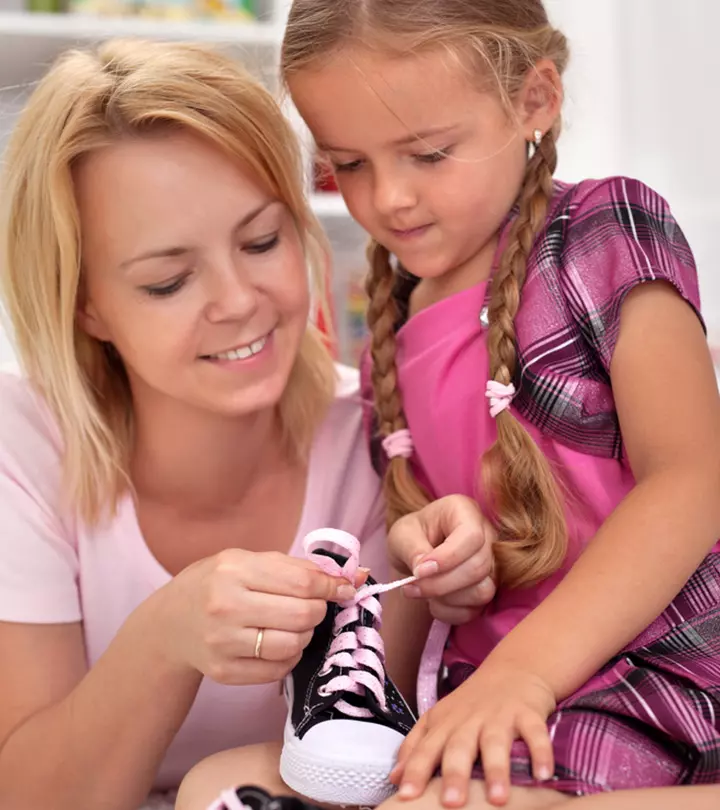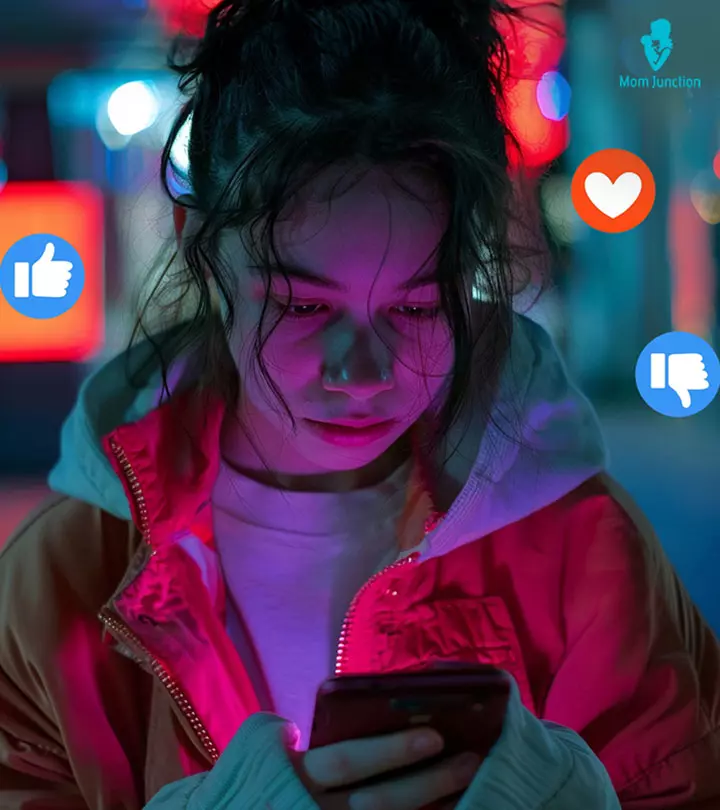
Image: Midjourney/ MomJunction Design Team
When speaking about the influences of media on teenagers, we may quote the well-known singer and lyricist Jim Morrison, who aptly said, “Whoever controls the media, controls the mind.” Media has the capability of shaping the ideas and beliefs of the receptive brains of adolescents.
With the advancements in technology, media has become an almost inseparable part of our lives. While media exposure has positive impacts on teens’ physical, psychological, and social development, it has negative ramifications too. Therefore, knowing about the dual nature of media’s influence is important for both teens and their parents. In this post, we tell you about the possible impacts of media on teens and share some useful tips to manage media influence on children and adolescents.
Key Pointers
- Social media can be a source of inspiration, a platform for self-expression, and a means for teenagers to develop social skills.
- Inappropriate use of social media could impact a teen’s self-image and mental health and instill wrong perceptions.
- Not being careful with whom teens socialize could increase the risk of cyberbullying.
- Parents must educate themselves and their teens to reap the benefits of social media.
Positive Effects Of Media On Teens
Exposure to the media is not always harmful
. It can also positively influence their behavior and attitude, which can be observed in the following ways (1) (2). But remember, it depends on the quality of content the child is watching.
- Mode of entertainment and self-expression: Social media platforms, like Facebook, Twitter, and Instagram, provide space for teens to interact with people of similar interests across the globe. Teens find this interaction entertaining and satisfying for their self-expression, thus boosting their confidence and self-esteem.

Image: IStock
- Could be a source of inspiration: Online documentaries, movies, inspirational stories on the internet, print, and broadcast media can be a source of inspiration for your teen. For instance, you and your teen could watch real-life-based movies such as Steve Jobs and Chaplin to get inspired in life.
- Helps develop social skills: Some teens and tweens are introverted. For them, social media is a free environment where they can interact without much hesitation. Social networking helps them develop social skills that are necessary for effective communication. Effective communication is necessary to develop and maintain relationships.
- Develops social and political sense: Teens and tweens who take an interest in current affairs and news are highly likely to be interested in social, political, and human development issues, like poverty, global warming, etc. It is an important positive effect that could help determine your child’s personality and interests. In this manner, the media could be a useful tool for education.
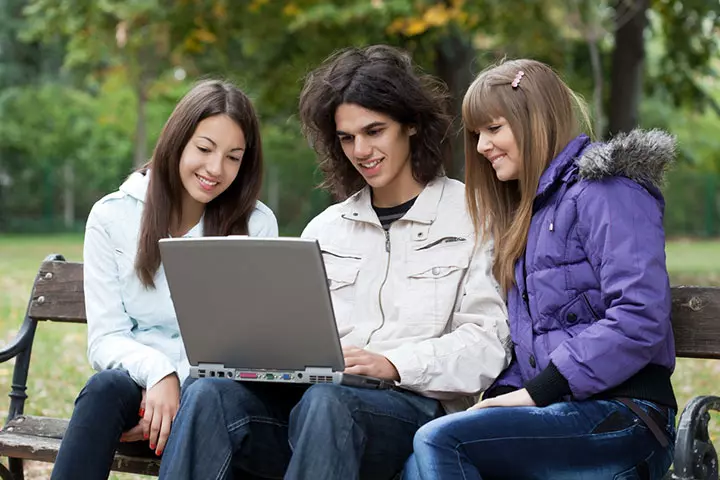
Image: IStock
- Makes them aware of the importance of health: Media disseminates information on health and well-being. A teen, who pays attention to such information, is more likely to be aware of various health issues like teen depression, childhood obesity, etc., and their possible solutions. This might help them make informed and healthy lifestyle choices.
- Aids in developing an identity: TV shows, series, and movies with good-quality content can help your tween and teen develop an identity. For example, a movie that reflects gender equality may motivate a teen to follow that in their life. You can strike up a discussion on such issues to educate your child.
Teenagers in the US believe that social media has positive effects on people of their age. Some of the prime reasons offered by teenagers are shown in the graph below.

Leading reasons why teenagers in the United States feel that social media has a mostly positive effect on people their own age as of April 2018
Source: Teens, Social Media and Technology 2018According to the survey, 40% of US teens feel that the most positive effect of social media is that it allows them to connect with their friends and family.
Negative Effects Of Media On Teens
There are several ways in which visual media and social media use can become a source of negative influence. Here are some scenarios that must be evaluated (1) (2) (3).
- Might lead to health and developmental issues: Extended screen time is associated with poor academic performance, sleep deprivation, reduced physical activity, and face-to-face social interaction. All these factors are associated with health issues, such as obesity and the negative impact on the overall development.

Image: IStock
 Quick tip
Quick tip- Could develop unrealistic body image: Media and popular culture influence how teens interpret beauty and positive body image. For instance, the media usually creates an impression that “thin and fair” are beautiful features to have. Such misleading messages can have a negative effect on the child’s self-esteem.
- Might instill wrong perceptions: Media often portrays a grown-up to be cool if they eat junk food, smoke, drink alcohol, use drugs, drive fast, etc. All these presentations of adult life can have an influence on a tween or teen, making them emulate their favorite actors.
- Might develop erroneous beliefs: Social platforms sometimes are used to spread biased information and fake news. They may create several unwanted stereotypes too. Teens may start believing the provided information, thus causing a shift in their attitude and behavior. Several real-life cases demonstrate how online platforms are used to promote hateful or biased attitudes towards a section of people, eventually causing dreadful results.

Image: IStock
- May develop mental health concerns: Tweens and teens often get exposed to bullying, rumor spreading, unrealistic views of other people’s lives, and peer pressure through the media. All these factors can cause a negative ripple effect on the teen’s mental health. They may become depressed, anxious, isolated, and possibly suicidal.
- Might develop violent behavior: A study showed that watching violent television shows and an increase in children’s violent and erratic behavior are positively correlated (4). Similarly, studies show that playing violent video games alters a teen’s behavior and could make them aggressive (5). There are different effects of video games on teenagers.
- Might cause addiction: Habitual viewing or gaming may be the most speculated negative effect of the media, especially social media. Research shows that the overuse of social media networking could lead to stimulation that is similar to other addictive behaviors. Most teens post pictures or feelings online and eagerly wait for likes, shares, and positive comments from friends. These experiences activate the brain’s reward system and increase the levels of dopamine. It can raise the likelihood of teen social media addiction in the long run (6).
- Might cause FOMO (Fear of Missing Out): FOMO due to social media influence can leave your teen feeling lonely or can enhance feelings of inadequacy. For instance, they may feel like they don’t have enough or they are not enough.
Another negative impact of media is cyberbullying, a serious threat to teens and young adults. It may cause mental health issues such as low self-esteem and suicidal ideas (9).
How To Identify The Signs Of Bullying
If your child is experiencing cyberbullying, you may observe alterations like.
- They may display nervousness or anxiety when using their devices.
- They may hesitate or show reluctance in using devices.
- They may exhibit negative emotions after spending time online.
- Teens may show the signs of withdrawal from both online and offline social interactions.
- They may show reluctance in attending school or leave classes early.
- There may be changes in their eating or sleeping habits.
- They may show signs of depression, anxiety, or indications of suicidal thoughts, signaling potential distress.
How To Address Cyberbullying
Addressing cyberbullying is crucial to create a safer online environment. Here are some steps you can take to address and prevent cyberbullying:
- Initiate an open conversation with your child and assure them of your commitment to stop the bullying.
- Create a non-judgmental, supportive environment to instill confidence in resolving the issue.
- Encourage your child to share a detailed account of the situation while maintaining composure and emphasizing unwavering support.
- Verify that your child’s social media accounts are private, limiting access to known individuals.
- Report the bullying to social media platforms, emphasizing their serious approach to such matters.
- Instruct your child to save evidence through screenshots for effective reporting.
- Utilize device settings to electronically block the bully, preventing further communication and harassment.

Image: IStock
In this perspective, Zahra Ali, a 22-year-old British writer and editor, records her negative social media experience as a teenager. She states, “Social media was our third place, a community area away from school and home and now it was all collapsing in on itself. The effect on my mental health was intense, to say the least. My and my friends’ privacy had been breached and we were at an all-girls school where being catty seemed like the default setting. I wished I had never gone online.”
She further mentions how she had understood the harmful effects of social media as she grew older. She adds, “I’m getting better at managing my screen time and at using the Internet as a resource for inspiring content, not the stuff that depresses me. I know not to believe everything I see and to engage in critical thinking. I know that the Internet is forever, and some personal situations are better kept offline. But I got online at the age of 12. And I wish someone had sat me down and taught me these good habits (i).”
The negative and positive effect of media on your child depends on the amount of time spent on media and how well parents regulate the child’s exposure to it.
Tips For Parents To Protect Teens From Undue Media Influence
It is essential to guide the teen on age-appropriate use of all media, including television, radio, music, video games, social media, and even the internet.
It can help shield the child from undue media influence. Here are some simple steps that you could follow (7).
- Stay aware of your child’s likes and dislikes. Keep a record of the movies, shows, games, entertainment programs, and public figures/celebrities that your child likes. This way, you could stay on top of what influences your child the most
- Monitor your child’s media activities. For instance, if your child spends a significant amount of time on online platforms or forums, ask your child:
- What people talk about or discuss on that forum
- Does the forum seem to encourage a specific attitude
- Does the forum promote contempt towards any particular ethnic group, race, or gender
- Does the forum promote biased or hateful behavior
- Provide your teen with some digital support. Consider it very important to keep track of any abnormal behavior in your teen. Social media may sometimes cause issues that may lead to anxiety and irritability. In such cases, spend time with them and pay attention to their behavior.
- Discuss the pros and cons of the media. Encourage him/her to express his/her feelings about various programs, music, and media outlets. Discuss various social media platforms that the teen uses frequently.
- Be a role model for your child. The use of digital media among adults is as prevalent as it is in teens. Thus, be your child’s role model by limiting your screen time. Also, indulge in some social media activities with your child so that you could spend time together and understand your child’s preferences. As their role models, you can influence them to use media only for the correct purposes.
- Talk about media messages to help guide your teen on the ways to handle the influence in life. For example, if your teen likes watching grooming channels on YouTube, then you could talk about the paid product endorsements, advertisements, and sponsorships.
- Set rules and limits about screen time for all media sources. This way, you will be able to monitor what your child is watching and for how long.
- Do not keep a television, computer, or video game console in your child’s bedroom. It is best to keep digital media equipment in a common space and preferably have shared passwords.
- Restrict shows, games, and apps that promote illicit behavior. You should explain why some entertainment programs are not suitable. You could also block channels and websites on the internet that you think are inappropriate. However, in a calm and rational manner, discuss your motivation with the teen and explain why such content can be bad for them.
- Advice your teen to plan the week’s viewing schedule in advance. Under parental supervision and regulation, teens can make these choices about media consumption. You can also be a role model by making your choices wisely. Praise your child for making good and appropriate choices.
- Encourage your teen to spend time with the family doing indoor and outdoor activities like swimming, skiing, camping, etc. Such activities are a great opportunity to talk to your teen and develop a rapport with them to understand their preferences.
- Motivate your child to indulge in group activities by joining local communities, groups, clubs, etc. This motivation will help your child balance media use with other activities.
- Suggest your teen to analyze the content presented in the media by asking some questions. For instance, watch a series with your teen and ask your teen:
- What he/she liked in the series
- What his/her motivation was to select a particular series
- What message he/she received from it
- What his/her expectations were from it
This activity will help your teen differentiate between reality and fantasy. It will also help your child sort facts from opinion, identify advertising, understand bias, and become aware of the misuse of statistics. Moreover, it is an excellent way to hone their decision-making and critical thinking skills.
- Encourage your teen to question his/her role model. Guide him/her to ask himself/herself:
- Why he/she likes a certain public figure or celebrity
- Reasons for following a celebrity/public figure
- Specific values that interest him/her before he/she chooses to follow someone
- Motivate your teen to participate in media awareness programs in communities and schools. Such activities could equip your child with all the necessary skills needed to ensure the positive use of media. Participating in mentoring programs is another option that you and your child could discuss.
- Discuss the effects of peer pressure with your teen. They might be unknowingly swayed by it. You can address these concerns if they have body image issues due to peer pressure and media. Proper communication about their issues could also boost their self-esteem.
- Give your teen some responsibility for certain tasks. For example, you can ask them to plan the weekend’s getaway or the weekly menu. This activity encourages your teen to complete their tasks and develops their analytical skills, keeping them away from media and teaching them to take delight in simple things.
How Can Media Celebrities Influence Teenagers?
Celebrities are powerful influencers that have become an inevitable part of the media. Their power to influence is used in promoting and advertising an idea, belief, behavior, or product. In particular, teenagers are one of the most vulnerable audiences that easily get attracted to lifestyles, products, or behavior that celebrities promote on social media. These influences can be positive, but at times, they can be negative, as well.
Thus, it is important for parents, educators, and caregivers to guide children and teenagers on responsible analysis of the content. It is crucial as most of the endorsements done by celebrities are paid.
Frequently Asked Questions
1. How does the representation of gender, race, and ethnicity in the media affect teenagers’ attitudes and perceptions of these issues?
If media representations of gender, race, and ethnicity support stereotypes and encourage biased or discriminatory opinions, it can lead to negative attitudes and perceptions in teenagers. But, these subjects’ positive and correct portrayals can foster acceptance and understanding among teens.
2. How can media literacy education help teenagers to analyze and evaluate the media they consume critically?
Media literacy education can help teens to critically examine and assess the media they consume by making them question the messages and values depicted in media, spot biased and stereotypical information, and understand the media’s perspective. By gaining an understanding of censorship and developing critical thinking skills, teens can make informed decisions about the media they consume.
3. How does the media shape teenagers’ values and beliefs?
Media can be an influential factor in shaping teenagers’ values by exposing them to new ideas and views, affecting their opinions and attitudes, and challenging current beliefs and traditional values (8).
4. How do different forms of media, such as TV, movies, and video games, impact teenagers differently?
Different forms of media might not impact teenagers differently, but the different content of these platforms may have different impacts. For instance, educational TV shows, video games, and movies may enforce learning and knowledge, while violent content may cause aggressive teenage behaviors.
The influence of the media on teenagers is unavoidable. While it can provide a platform for your teenagers to express themselves, develop social skills, etc., it can also have some negative effects–instilling false messages, false beliefs, violent behavior, spending too much time in front of a screen may cause health and development issues. The greatest way to safeguard your children from negative media impact is to arm them with tools such as awareness and analysis and guide and teach them through the process without intimidating your child. Additionally, parental supervision may assist children in gaining the maximum benefits from any media.
Infographic: Tips To Protect Teens From Undue Media Influence
With most educational tasks linked to the web, the daily routine of teens is inextricably linked to online and social media. Nonetheless, ensuring their online safety is crucial for parents. This infographic presents valuable suggestions for protecting your teens from undue media influence. Illustration: Momjunction Design Team
Illustration: Positive And Negative Influences Of Media On Teenagers
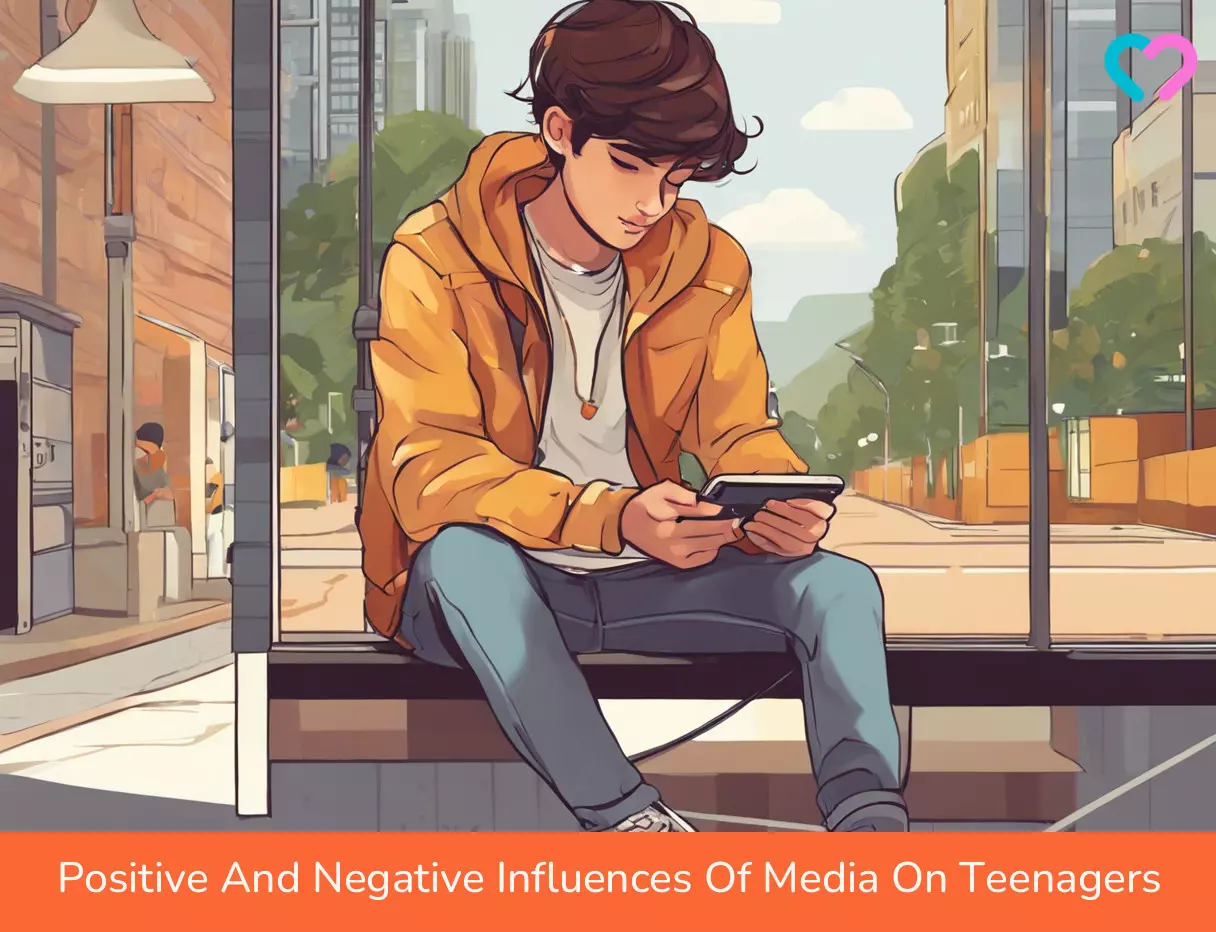
Image: Stable Diffusion/MomJunction Design Team
Social media has become an integral part of teenagers’ lives. Watch this video to know what are the effects of this on their mental health and well-being.
Personal Experience: Source
MomJunction articles include first-hand experiences to provide you with better insights through real-life narratives. Here are the sources of personal accounts referenced in this article.
i. Should teens be trained before using social media?;https://medium.com/@zahrazuhoorali/should-teens-be-trained-before-using-social-media-567f4ece90b3
References
1. Media influence on teenagers: social media, movies, YouTube and apps; Raising Children
2. Teens and their experiences on social media; Pew Research Center
3. Lauren Hale et al.; Youth screen media habits and sleep: sleep-friendly screen-behavior recommendations for clinicians, educators, and parents; NCBI
4. Rowell Huesmann; The Impact of Electronic Media Violence: Scientific Theory and Research; NCBI
5. Rong Shao and Yunqiang Wang; The Relation of Violent Video Games to Adolescent Aggression: An Examination of Moderated Mediation Effect; NCBI
6. Eduardo Guedes et al.; Internet Addiction and Excessive Social Networks Use: What About Facebook?; NCBI
7. Impact of media use on children and youth; NCBI
8. Melanie Burleson Richards; (2010);Mass Media’s Relationship with Adolescents’ Values and Behaviors: A Theory of Mediated Valueflection ;Georgia State University.
Community Experiences
Join the conversation and become a part of our nurturing community! Share your stories, experiences, and insights to connect with fellow parents.
Read full bio of Tamara Green
Read full bio of Sagari Gongala
Read full bio of Harshita Makvana
Read full bio of Apoorva K





